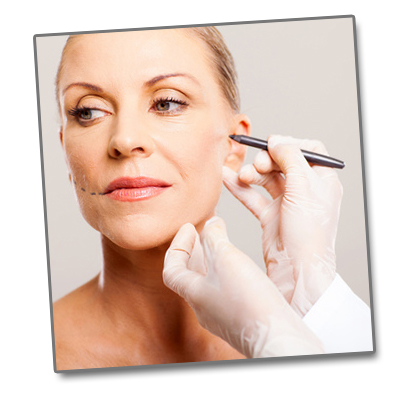
Choosing a qualified plastic surgeon is critical to the success of your procedure. We have provided this excerpt from the book “The Smart Women’s Guide to Plastic Surgery” written by Jean M. Loftus, M.D. as a reference. Please note that Dr. Hainer agrees with Dr. Loftus and he does meet all the criteria she suggests.
FINDING A QUALIFIED PLASTIC SURGEON
Finding a qualified plastic surgeon can be challenging. Do not underestimate the complexity of this important task.
Some people assume that if they call their local hospital to ask for a recommendation, they will be referred to the best plastic surgeon at that hospital. On the contrary, telephone referrals are usually divided equally among all plastic surgeons at a hospital, regardless of skill. If you call to ask for a referral, you may simply be given the next name on the list.
One valid way to find a qualified plastic surgeon is by personal recommendation. If a friend was satisfied with the care provided by a surgeon, then chances are that you will be similarly pleased. Or, ask someone in the medical profession, such as your family doctor or a nurse. Keep in mind, however, that doctors and nurses may be familiar only with the physicians at their own hospitals, and they may refer to surgeons based on personality or friendship rather than ability.
Many cosmetic surgery patients prefer not to ask others for recommendations, to preserve the secrecy of their plans. If privacy is important to you, then your task just became more difficult. You may look for a board certified plastic surgeon in the telephone directories, but, as you will see, deceptive advertising tactics pervade cosmetic surgery. And the problem only starts there.
BOARD CERTIFICATION
The American Board of Medical Specialties serves the public interest by overseeing medical boards in the United States. Examples of medical boards include The American Board of Plastic Surgery, The American Board of Anesthesiology, The American Board of Pediatrics and 21 others.
Each board is responsible for certifying only those physicians with the training, judgment and skill necessary for safe, independent practice within that specialty.
The educated public thinks that it is shrewd to look for the phrase “board certified” as an assurance that their physician is capable and credible. But, the term “board certified” means little, unless the board itself is named. If a cosmetic surgeon states that he or she is board certified, you might assume that it is by the American Board of Plastic Surgery. Yet it could be from any board. Look for physicians who state the exact nature of their certification.
CERTIFICATION BY THE AMERICAN BOARD OF PLASTIC SURGERY
The term “Certified by the American Board of Plastic Surgery” has significant meaning; the term “board certified” means little.
Plastic surgeons who are certified by the American Board of Plastic Surgery (ABPS) must complete all of the following requirements:
- Graduate from an accredited medical school
- Complete prerequisite training (typically five years) in an approved surgical residency program
- Complete two to three years of training in an approved plastic surgery training program
- Be recommended by their training program chair for ABPS eligibility
- Pass a comprehensive written examination
- Submit a detailed list of all operations performed during their second year of practice, which is closely scrutinized by the ABPS
- Pass a three-day oral examination
- Meet moral and ethical standards set forth by the ABPS
Thus, the term “Certified by the American Board of Plastic Surgery” has significant meaning; the term “board certified” means little.
Some doctors who trained in specialties other than plastic and reconstructive surgery do provide high quality care in cosmetic surgery. In fact, plastic surgeons sometimes invite them to give lectures at plastic surgery meetings.
The American Society of Plastic and Reconstructive Surgeons (ASPRS) inducts only plastic surgeons who are certified by the American Board of Plastic Surgery. To obtain the names of these plastic surgeons in your area, call the ASPRS in Chicago at 800-635-0635 or visit their web site at http://www.plasticsurgery.org.
TELEPHONE DIRECTORIES
In most metropolitan telephone directories, only about two-thirds of the physicians listed under “Plastic and Reconstructive Surgeons” are certified by the American Board of Plastic Surgery (ABPS). Of the remaining third, some may be certified in specialties that, although not limited to plastic surgery, do provide formal training in cosmetic procedures.
Alternatively, some physicians listed may have no formal training at all in cosmetic surgery. Telephone directories in most states do not require physicians to state from which board they received certification. Therefore, physicians may advertise under “Plastic and Reconstructive Surgeons” without being certified by the ABPS or equivalent.
SELF-DESIGNATED BOARDS
Furthermore, any physician may seek certification from self-designated boards. A self-designated board is not recognized by the American Board of Medical Specialties. Requirements for membership in some of these “boards” are meager. Some self-designated boards have been accused of existing solely to promote their members.
Examples of self-designated boards according to the Board of Medical Specialties:
- The American Board of Aesthetic Plastic Surgeons
- The American Board of Cosmetic Plastic Surgery
- The American Board of Cosmetic Surgery
- The American Board of International Cosmetic and Plastic Facial Reconstructive Standards
- The American Board of Laser Surgery
- The American Board of Plastic Esthetic Surgeons
These boards may sound impressive, but according to Joyce D Nash, author of What Your Doctor Can’t Tell You About Cosmetic Surgery, “Certification of competency from such organizations is probably meaningless.”
Back in 1989, the U.S. House subcommittee on Regulations held hearings on cosmetic surgery. The congressional staff report concluded, “Anyone and any group can create a board, call itself anything, and issue certificates suitable for framing. So far, 102 of these self-designated boards have sprung up.” Since then, little has changed. Most states have no laws restricting the formation of boards.
LEGAL BUT UNQUALIFIED SURGEONS
The public assumes that if physicians perform a surgical procedure, they are appropriately qualified. That may be true in the hospital setting but not necessarily true in the doctor’s office.
Hospitals are able to ensure quality of care through two mechanisms: privileges and peer review. Physicians must have privileges for each procedure they perform. The hospital credentials committee, composed of other physicians, grants permission only to those physicians who are considered qualified to perform a given procedure. Then physicians’ performance is subjected to peer review. If the quality of care they deliver is deemed substandard, then they may lose their privileges to perform that procedure in the future.
But in the doctor’s office, uniform regulations do not exist. In most states, physicians may perform any procedures they choose, whether qualified or not. This unregulated setting has made it possible for untrained physicians to perform cosmetic surgery. If your doctor suggests office surgery, be certain she has privileges to perform the same procedure in the hospital, as evidence that her peers have deemed her qualified. Understand, also, that hospital privileges are neither foolproof nor consistent throughout the country.
To confirm that hospital privileges exist, ask your surgeon at which hospital he or she can perform your procedure. Then call the hospital and ask to speak to someone in the medical staff office. That person should be able to tell you whether your surgeon has privileges for your operation.
